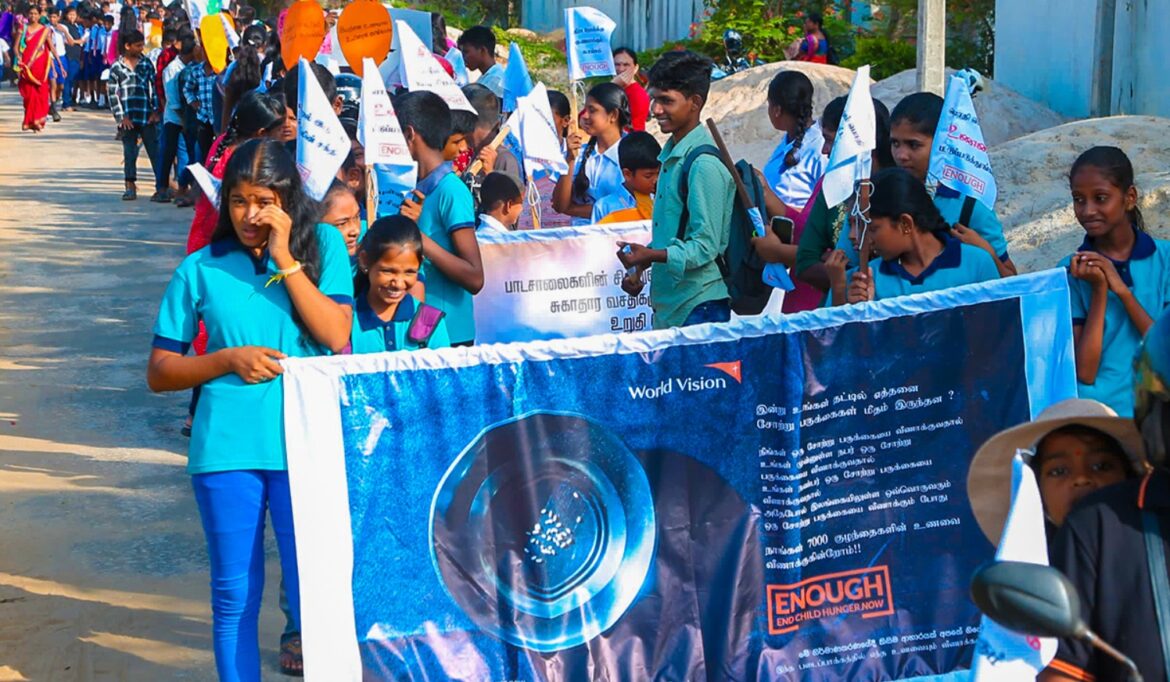Recent baseline research initiated by World Vision Lanka, in association with the Wayamba University, revealed that out of many factors, unregulated school canteens are a leading cause for unhealthy, high sugar, and processed junk food consumption in children.
Apart from findings related to school canteens, the study revealed other underlying causes of malnutrition such as lack of proper meals due to economic hardships, lack of nutrition awareness and education, and weak school feeding programmes. It also revealed the impact of cultural and gender influences and maternal and child health care service gaps on increasing malnutrition among children.
This comprehensive baseline assessment research was carried out across Vaharai (Batticaloa District) and Kalpitiya (Puttlam District), Bibile (Monaragala District), Watawala (Nuwara Eliya District), Chavakachcheri (Jaffna District), Rideegama (Kurunegala District), and Wattala (Gampaha District), in association with Department of Nutrition and Dietetics, Faculty of Livestock, Fisheries and Nutrition, of the Wayamba University, as a part of World Vision’s ENOUGH – campaign to end child hunger and malnutrition. The study encapsulated testimonials from fathers, mothers, local authorities, and especially children about their nutrition challenges.
“Sri Lanka is currently facing a double burden of malnutrition,” said Professor Renuka Silva of the Department of Nutrition and Dietetics, Faculty of Livestock, Fisheries and Nutrition, sharing his views at the unveiling event of the study.
“There are high rates of undernutrition, including stunting (15-20%) and wasting (15%) in rural and isolated communities in estates all while a rise in obesity rates is recorded in the urban areas,” he said.
He emphasized the imperativeness of data availability for government authorities to take informed decisions especially when drafting policies and raised pressing issued about the lack of data availability on nutrition in Sri Lanka.
He said, “We don’t know how much protein and minerals our people are consuming up to now. There is no national nutrition or diet survey. In other countries, they survey every 5 years. They know what their people are really consuming. We are recommending people to eat food without proper data.”
Furthermore, Professor Renuka presented recommendations such as enhancing monitoring and evaluation mechanism, expanding social protection measures, strengthening grassroot level involvement, leveraging climate resilient agriculture, fostering private sector partnerships, and integrating nutrition goals into broader possibilities to uplift child nutrition.
Sharing her views at the event, World Vision Lanka National Campaign Manager Lavanya Sirikumara said, that 95 policies relating to child nutrition are yet to be implemented. Moreover, she said, “48,100 children are yet to receive nutritious school meals, and 13 system changes needs to be implemented to enhance child nutrition in areas that were subjected to the research.”
She continued to say that she expects to see this baseline study shared among the practitioners’ advocates and government officials. She added that she wishes that policy makers would make use of this study to make evidence-based decisions, and other nonprofit organizations and businesses and communities would actively engage themselves with these findings.
Among those who were present at the event were the Wayamba University research team, government officials, corporate and non-corporate representatives, and World Vision Lanka staff.



